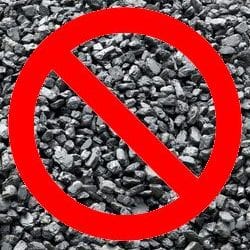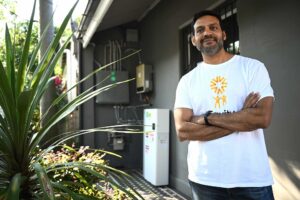The German minister responsible for that country’s “Energiewende” says it is time that the private sector around the world realized that the age of fossil fuels is over, and his own country’s energy transition is irreversible.
Last week, new data from Bloomberg New Energy Finance suggested that in 2015 – like 2014 – more money was invested in renewable energy generation than in fossil fuels. Some $US329 billion went into clean energy investment in the last year.
But still, enormous amounts not captured by this data appear to be spent searching for new reserves to replenish and expand fossil fuel resources.
Some of that investment may need to be re-considered, particularly in light of new data coming out of China, which reveals a 3.5 per cent reduction in coal consumption in the country’s biggest coal consumer, and a 2.8 per cent cut in coal-fired generation, well ahead of all estimates.
“These figures are staggering and totally non consensus,” said Tim Buckley, Director of Energy Finance Studies at the Institute for Energy Economics and Financial Analysis (IEEFA).” The implications for the global coal industry and indeed global financial markets simply cannot be understated.”
Earlier this week, Rainer Bakke, the German minister for state said climate science and the targets agreed at the Paris climate talks are quite clear in their implications: the world has a “carbon budget” equivalent of jus 1,000GT of carbon emissions.
This compares to the 15,000GT that would be released if all known fossil fuel reserves were burned. That means, that 14,000GT has to be left in the ground in 2015.
“My question to the private sector is this: ‘When are you going to learn that the age of fossil fuels is over’,” Bakke told the annual assembly of the International Renewable Energy Agency in Abu Dhabi this week.
“That is the key question. When is the old economy going to accept that it is over, and when are they going to be willing to sit down with us to talk about a game plan to phase out fossil fuels.”
Bakke is the man responsible for ensuring that Germany’s Energiewende, or Energy Transition, away from fossil fuels and nuclear to renewable energy, stays on track.
Bakke says the Energiewende is still going strong. In the last year, the share of renewable energy in the German grid jumped from 27 per cent to 32.5 per cent, which he said was unprecedented as a percentage rise.
Since 2007, the share of renewable energy has grown from just 7 per cent. “That is an extraordinary rise,” he said. The government expects that by 2050, 80 per cent of all energy needs will come from renewables.
In a later interview with RenewEconomy, Bakke said it was clear that the technology battle had already been won by wind and solar. The task now was to provide the integration, through software, market design, storage, flexibility and regulatory changes, to make sure it was both “ecologic and economic”.
Bakke said the next phase of the Energiewende is to ensure a push to digitization of the grid, which he says is essential. Accompanying this is the need for a change to regulatory measures and market design.
This includes mechanisms that allow for flexibility on the side of generation, flexibility on the demand side, flexibility through the grid, and flexibility through storage.
“The market has to drive these innovations,” Bakke says. Another focus is on addressing the transport and the building and industry sectors, rather than just the power sector – hence the reported push into supporting electric vehicles. (We’ll have more from Bakke’s interview in another article later this week).
Bakke’s policies are not without critics, even within the renewable energy industry. One of the biggest criticisms is his push to replace feed in tariffs with auctions.
While it is true that auctions are an effective mechanism to find lowest cost pricing, there is a fear that the mechanism effectively shuts out community-level rojects.
And one of the underlying successes of the Energiewende has been the fact that it has been largely driven by community ownership, and supported by the community.
(Later this week we will report on our interview with Bakke in more detail).
One of Germany’s main issues is how to ensure the removal of the huge lignite (or brown coal) plants, which for political, social, and more recently market reasons (the low carbon price), are proving hard to shift.
The issue of fossil fuel subsidies is a critical one. At a debate held in IRENA’s new headquarter held in the heart of Abu Dhabi’s experiment in sustainable development, Masdar City, it was pointed out that fossil fuel subsidies are more than offsetting incentives for renewables.
Data from the International Energy Agency shows that fossil fuel subsidies outrank those for renewables by a factor of 10 to 1. According to the IMF, if the health and environmental impacts are including, it is by a factor of 100 to 1.
Like Bakke, Figueres invited the private sector to work back from the climate targets agreed in Paris, “connect the dots” and work out what that means for future investment. “The long term direction is abundantly clear.”
Kyung-Ah Park, the head of environmental markets at Goldman Sachs, and one of the key drivers of that groups massive commitment to low carbon investments, agreed that it was a good time to dump fossil fuel subsidies.
But she said markets need to see the Paris pledges transformed into clear, long term policies by individual countries.
Park said there is no shortage of capital, or of interest in renewables. What there is a lack of solid long term policies. She noted, for instance, that when the Paris deal was signed, US solar stocks jumped 5 per cent. A week later, when the Obama administration locked in a further five year period for the investment tax credit, providing certainty for the sector, solar stocks jumped 30 per cent.
Park said it was clear that capital was looking for long term investment signals, but corporates were also looking for investments, while the actual technologies were breaking all records.
Back on the subject of China, Barclays released a report highlighting how critical that country was to meet the targets, suggesting it accounts for at least one third of the gap between the effects of current policies, and the targets agreed in Paris.
Various analysis suggests that the individual country agreements offered in Paris reduce the anticipated rise in temperature to 2.7C to 3.0C. That is still well above the 2C maximum agreed in Paris, and its more aspirational target of 1.5C.
Barclays suggests that China’s CO2 emissions from energy will peak already by 2025 at 10.3Gt (five years ahead of target), and thereafter start trending down to reach 9.8Gt by 2030.
“The investment decisions China makes over the next 10-15 years with regard to energy and industrial infrastructure will also be absolutely crucial in determining whether the world is able to adjust its course onto a 2°C pathway,” Lewis said.









